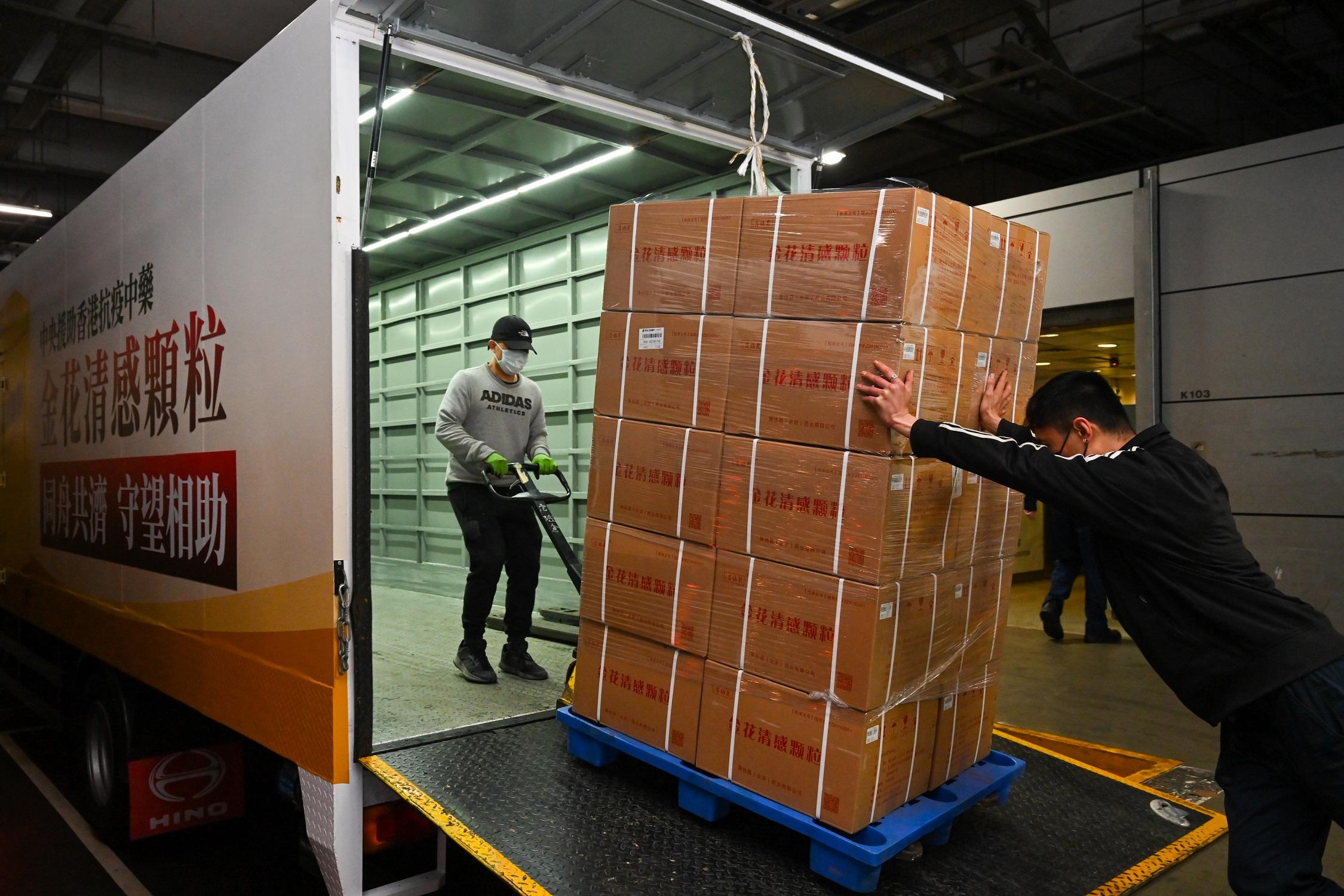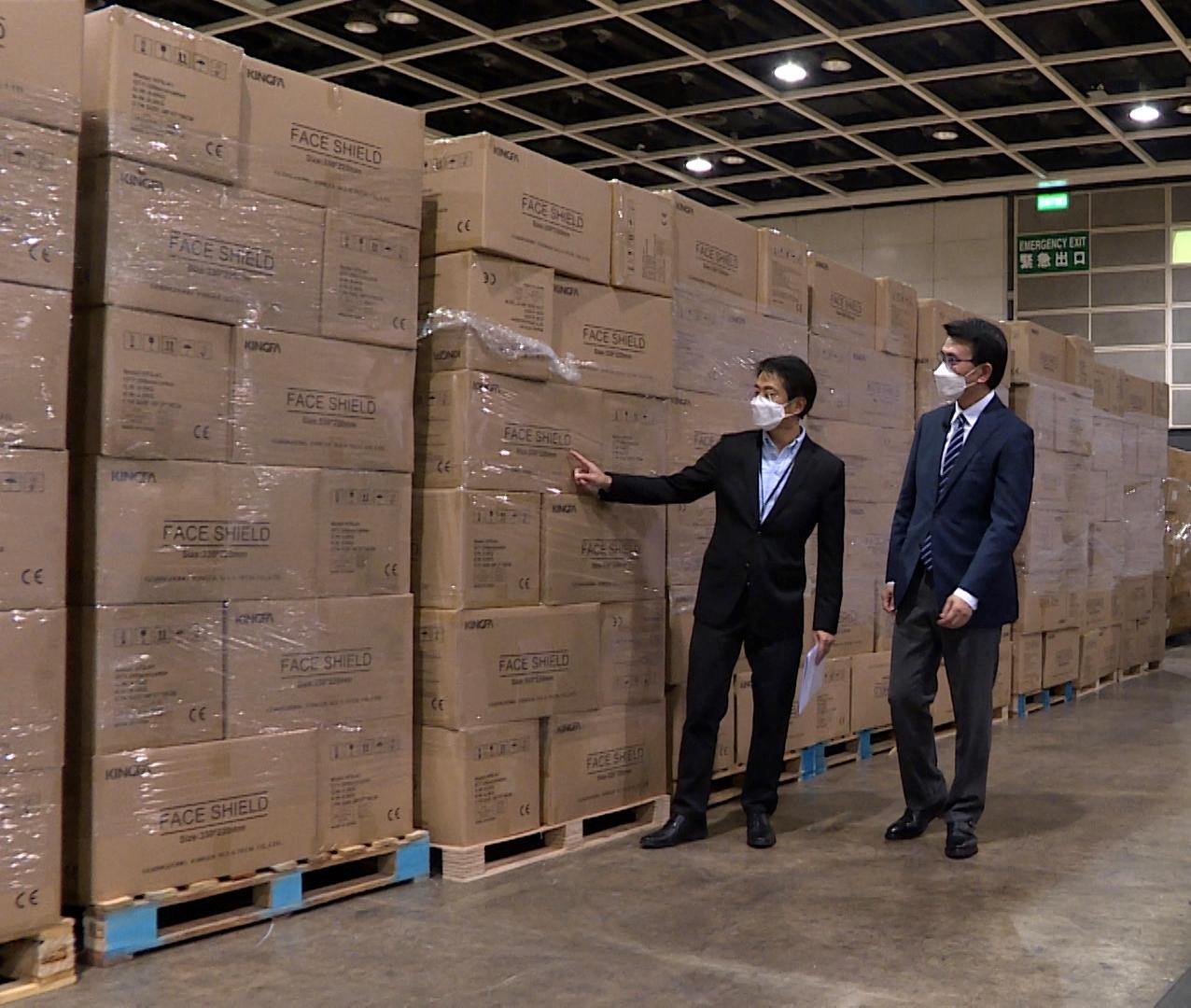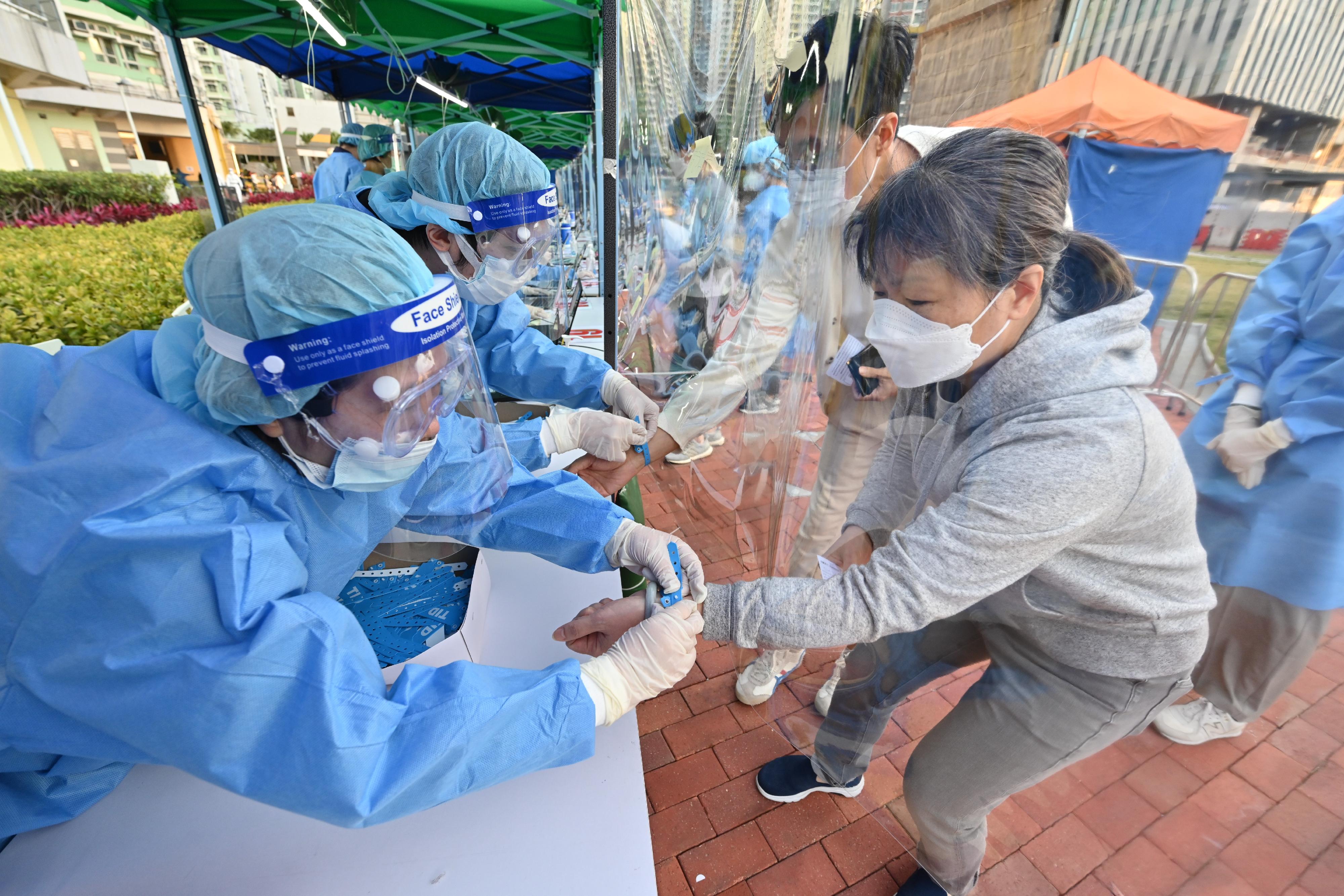CEDB and its departments united for anti-epidemic work (with photos)
The Commerce and Economic Development Bureau (CEDB) and its departments have been actively participating in anti-epidemic work since the outbreak of COVID-19, going beyond their policy purview and collaborating with colleagues from other bureaux and departments as well as various sectors of society to fight the epidemic.
The Permanent Secretary for Commerce and Economic Development (Commerce, Industry and Tourism), Miss Eliza Lee, today (March 29) said, "Over the past two years, the Commerce, Industry and Tourism Branch and its departments, with full commitment to combating the epidemic, have been actively participating in anti-epidemic work ranging from facilitating local mask production earlier to devising, expeditiously processing and disbursing subsidies to the tourism industry and the convention and exhibition industry in multiple rounds of the Anti-Epidemic Fund (AEF), as well as leading frontline 'restriction-testing declaration' (RTD) operations and taking part in contact tracing of confirmed cases recently."
The Permanent Secretary for Commerce and Economic Development (Communications and Creative Industries), Mr Clement Leung, said, "Considering the severity of the fifth wave of the epidemic, the Communications and Creative Industries Branch (CCIB) has fully mobilised its manpower to support the task force of ensuring medical supplies led by the Secretary for Commerce and Economic Development (SCED). Colleagues in the departments under the CCIB have also been participating in frontline RTD operations as well as offering back-end support to facilitate the work of the AEF for the creative industries."
At the onset of the outbreak, there was a severe shortage of surgical masks around the world and Hong Kong was no exception. To facilitate the establishment of local mask production facilities, the CEDB launched in March 2020 the Local Mask Production Subsidy Scheme to significantly enhance the stability of local production and supply. The 20 subsidised production lines collectively delivered 469 million masks to the Government in a year. The CEDB also provided technical support through the Hong Kong Productivity Council to other factories to set up 35 local production lines.
Hongkong Post prioritised the handling and delivery of parcels containing surgical masks at the onset of the outbreak to meet the pressing needs of the public. It also delivered the first batch of masks procured under the Subsidy Scheme to about 2.8 million residential addresses in Hong Kong, and assisted in the delivery of the CuMask+™. Despite the pressure of the severe epidemic, Hongkong Post has generally maintained the postal services in the past two years.
Following the onslaught of the fifth wave of the epidemic, the CEDB and its departments have been fully committed to anti-epidemic work. The task force of ensuring medical supplies led by the SCED and supported by colleagues from the CCIB has been working tirelessly in close liaison with Mainland counterparts over the past month. With the co-ordination by the Central Government, the task force has been procuring large quantities of medical supplies for the Hong Kong Special Administrative Region Government's various aspects of anti-epidemic work. The medical supplies have also been provided to frontline personnel and members of the public affected by the epidemic.
With the staunch support of the Central Government, over 30 types of medical supplies broadly categorised under five main groups, namely testing, personal protection, disinfection, medication and equipment, have arrived in Hong Kong progressively. The supplies mainly include hundreds of millions of rapid antigen test (RAT) kits and high-grade protective masks, anti-epidemic proprietary Chinese medicines, paracetamol, various forms of personal protective gear and medical equipment. In view of the large quantities of supplies procured, colleagues of the CCIB have swiftly helped identify extra premises to enhance storage capacity and logistical efficiency. In the last few weeks, about 1 million anti-epidemic kits have been distributed to confirmed patients and their close contacts.
To cope with the severe epidemic, the Government has been continuously distributing supplies through multiple channels to frontline personnel to cater for their anti-epidemic work as well as to people in need, including confirmed patients, their close contacts and family members, staff and residents of residential care homes for the elderly and for persons with disabilities, residents subject to RTDs or living in areas testing positive under sewage tracing, and people working in high-risk industries such as cross-boundary goods vehicle drivers, property management staff and cleaning staff. To fight the virus together, the Government will also distribute in early April the medical supplies extensively to households in Hong Kong via anti-epidemic service bags.
In the face of the fifth wave of the epidemic, various brands of RAT kits have become available for sale in the market. The CEDB, jointly with the Consumer Council, launched the Approved RAT Kits Search Tool to allow members of the public to ascertain whether the RAT kits are on the approved lists of Hong Kong, the Mainland, the European Commission or the United States.
It is particularly important to promptly provide accurate information to the public during the epidemic. Radio Television Hong Kong (RTHK) TV 32, as a channel dedicated to disseminating anti-epidemic information, has been producing programmes with timely epidemic-related information for the public. Also, the Office of the Communications Authority (OFCA) under the CEDB has been co-ordinating with mobile network operators to improve the 4G/5G network reception at the quarantine centres, isolation facilities and cross-boundary checkpoints, ensuring persons undergoing isolation or treatment can maintain connections and communication with their families and the community.
To ensure a stable and sufficient supply of rice, Hong Kong maintains the Rice Control Scheme. In view of the previous episodes of people scrambling for daily necessities, the Trade and Industry Department (TID) took the initiative to immediately approach the trade to ensure that the rice reserve stock has been maintained at a sufficient level. The TID will continue to closely monitor the market situation and maintain communication with the trade.
Apart from handling the work in their respective policy areas, the CEDB and various departments under its purview, including the TID, Invest Hong Kong (InvestHK), the Intellectual Property Department, the Hong Kong Observatory, OFCA, RTHK and Create Hong Kong, joined the anti-epidemic work at the frontline. In the past month, some 2 000 officers from the CEDB and these departments have been mobilised to co-ordinate and conduct a total of 10 RTD operations. Meanwhile, staff members of InvestHK have been deployed to work in the Contact Tracing Office.
Staff participating in RTD operations come from different grades, including Administrative Officers, Executive Officers, Trade Officers, Investment Promotion Officers, Scientific Officers, Scientific Assistants, Radar Specialist Mechanics, Solicitors, Intellectual Property Examiners, Patent Examiners, Telecommunications Engineers, Inspectors (Telecommunications)/Controllers (Telecommunications), Regulatory Affairs Managers, Entertainment Standards Control Officers and Programme Officers, as well as officers from the Clerical and Secretarial Grades. This has demonstrated that the entire civil service stands in solidarity to fight the epidemic.
The fifth wave of the epidemic remains severe. Stabilising the epidemic situation as soon as possible is the most urgent task and the top priority of the civil service. The CEDB and its departments will do their utmost to help Hong Kong ride out the pandemic.




